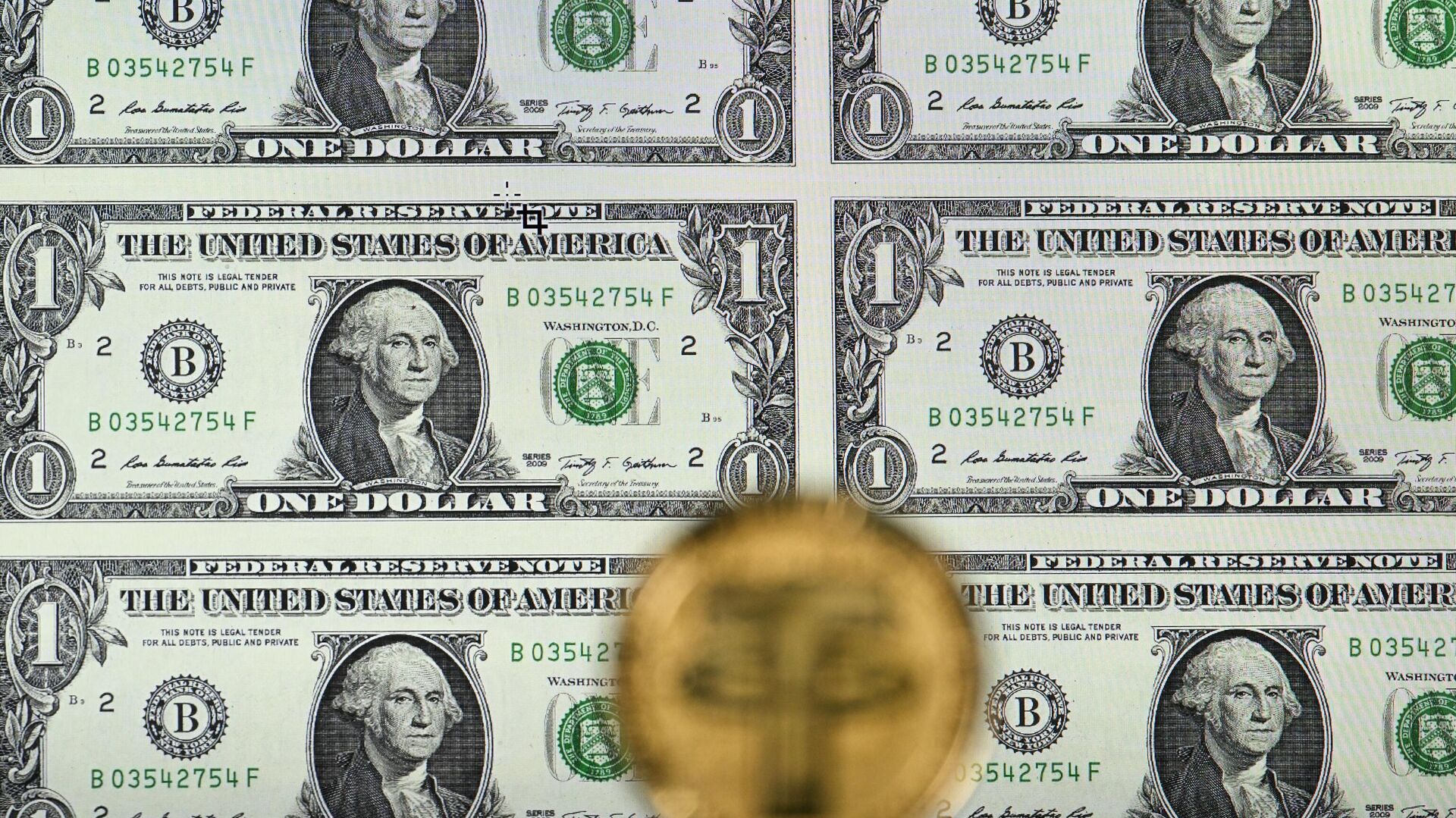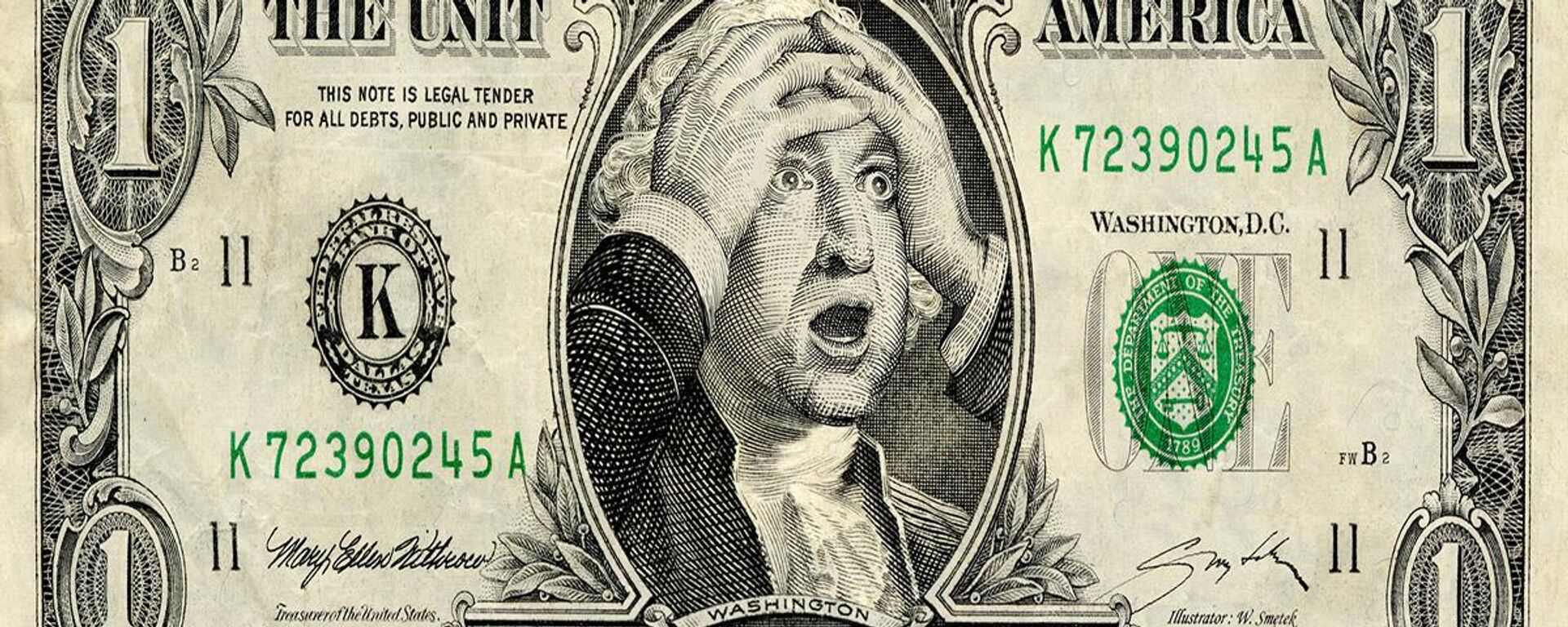https://sputniknews.in/20240321/dedollarisation-gold-prices-hit-all-time-high-as-investors-desert-usd-6903533.html
Dedollarisation: Gold Prices Hit All-Time High as Investors Desert USD
Dedollarisation: Gold Prices Hit All-Time High as Investors Desert USD
Sputnik India
Gold prices have hit a record high, a day after the US Federal Reserve said that it would implement three rate cuts in 2024 amid concerns around inflation in the world's biggest economy.
2024-03-21T19:29+0530
2024-03-21T19:29+0530
2024-03-21T19:29+0530
business & economy
us
india
european union (eu)
reserve bank of india (rbi)
ukraine
delhi university
gold reserves
dedollarisation
trade in national currencies
https://cdn1.img.sputniknews.in/img/07e7/05/12/2022261_0:160:3077:1890_1920x0_80_0_0_3e5c4549c8a13d159ada6924238682c3.jpg
Gold prices have hit a record high, a day after the US Federal Reserve said that it would implement three rate cuts in 2024 amid concerns around inflation in the world's biggest economy.The rally in gold prices came in the wake of a two-day Federal Open Market Meeting (FOMC), where the Feds left the interest rates unchanged but stated that it would work towards bringing down inflation within the 2 percent range.“The Committee will continue reducing its holdings of Treasury securities and agency debt and agency mortgage-backed securities, as described in its previously announced plans. The Committee is strongly committed to returning inflation to its 2 percent objective,” said a US Fed statement after the meeting which concluded on Wednesday.Observers predict that prices of gold are expected to rise further as investors lose confidence in the US dollar due to geopolitical factors.Increased Demand for Gold Validates Dedollarisation Trend, Says Indian EconomistProfessor Ashwani Mahajan, who teaches economics at Delhi University (DU), told Sputnik India that a surge in demand for gold in recent years lent further credence to the ongoing trend of de-dollarisation."Definitely, the de-dollarisation process has been accentuated by the Ukraine crisis," he stressed.Mahajan explained that investors were looking at other alternatives to USD-denominated trading and investments, which include switching to trading in non-USD currencies and investing in assets such as gold.Dollar Credibility Hurt by Western Proposal to Confiscate Russian AssetsIn fact, the European Union (EU) on Wednesday unveiled a plan at the so-called 'Association Council' between the EU and Ukraine, entailing the use of profits from Russian assets in the EU to help fund Ukraine's reconstruction.The Kremlin has firmly denounced the illegal plan, warning that it would retaliate to the move through a variety of methods.Implications for IndiaMahajan predicted that the rally in gold prices for the last two years would ideally "discourage" people from buying gold.The DU professor said that India, a net importer of gold, won't like its retail investors to buy gold, which could lead to a rising import bill and affect fiscal deficit (FD) targets set by the government.According to the World Gold Council (WGC), India's annual gold demand has averaged between 700 to 800 tonnes for the last five financial years.
https://sputniknews.in/20240229/india-shares-russias-de-dollarisation-goal-6705505.html
us
india
ukraine
russia
europe
Sputnik India
feedback.hindi@sputniknews.com
+74956456601
MIA „Rossiya Segodnya“
2024
Dhairya Maheshwari
https://cdn1.img.sputniknews.in/img/07e6/0c/13/138962_0:0:641:640_100x100_80_0_0_2cb44360dbcdf6d84bf4b299cd045917.jpg
Dhairya Maheshwari
https://cdn1.img.sputniknews.in/img/07e6/0c/13/138962_0:0:641:640_100x100_80_0_0_2cb44360dbcdf6d84bf4b299cd045917.jpg
News
en_IN
Sputnik India
feedback.hindi@sputniknews.com
+74956456601
MIA „Rossiya Segodnya“
Sputnik India
feedback.hindi@sputniknews.com
+74956456601
MIA „Rossiya Segodnya“
Dhairya Maheshwari
https://cdn1.img.sputniknews.in/img/07e6/0c/13/138962_0:0:641:640_100x100_80_0_0_2cb44360dbcdf6d84bf4b299cd045917.jpg
dedollarisation, dedollarisation news, brics dedollarisation, gold prices, us fed meeting, us fed news, us fed interest rate, us fed rate, gold prices, gold bonds india, gold price today, gold bond dollar, gold prices in delhi
dedollarisation, dedollarisation news, brics dedollarisation, gold prices, us fed meeting, us fed news, us fed interest rate, us fed rate, gold prices, gold bonds india, gold price today, gold bond dollar, gold prices in delhi
Dedollarisation: Gold Prices Hit All-Time High as Investors Desert USD
Amid the declining confidence in the greenback, the value of gold has consistently soared in the last two years. Gold prices are expected to rise further, as the dedollarisation of the global economy gathers steam.
Gold prices have hit a record high, a day after the US Federal Reserve said that it would implement three rate cuts in 2024 amid concerns around inflation in the world's biggest economy.
Gold futures were trading at over $2,212 per ounce in the US markets. In India, the world's second biggest consumer of gold behind China, prices rose to 66,943 INR ($806 approx.) per 10 grams.
The rally in gold prices came in the wake of a two-day Federal Open Market Meeting (FOMC), where the Feds left the interest rates unchanged but stated that it would work towards bringing down inflation within the 2 percent range.
“The Committee will continue reducing its holdings of Treasury securities and agency debt and agency mortgage-backed securities, as described in its previously announced plans. The Committee is strongly committed to returning inflation to its 2 percent objective,” said a US Fed statement after the meeting which concluded on Wednesday.
The US Fed projection of rate cuts has triggered a selling spree of US dollar, long considered a safe haven for investors, and consequently led them to flock towards other instruments such as gold. In fact, the value of the US Dollar weakened vis-a-vis major global currencies after the keenly-watched US Fed meeting.
Observers predict that prices of gold are expected to rise further as investors lose confidence in the US dollar due to geopolitical factors.
Increased Demand for Gold Validates Dedollarisation Trend, Says Indian Economist
Professor Ashwani Mahajan, who teaches economics at Delhi University (DU), told Sputnik India that a surge in demand for gold in recent years lent further credence to the ongoing trend of de-dollarisation.
"Since times immemorial, gold has been viewed as the safest bet for investors. However, we have witnessed that demand for gold has surged during any geopolitical crisis such as World Wars. Over the last two years, the Russia-Ukraine conflict and the subsequent western sanctions have led to a considerable decline in the reputation of US Dollar as the world's foremost reserve currency," stated Mahajan, who's also the co-convenor of economic advocacy group Swadeshi Jagran Manch (SJM).
"Definitely, the de-dollarisation process has been accentuated by the Ukraine crisis," he stressed.
Mahajan explained that
investors were looking at other alternatives to USD-denominated trading and investments, which include switching to trading in non-USD currencies and investing in assets such as gold.
Dollar Credibility Hurt by Western Proposal to Confiscate Russian Assets
Mahajan underlined that another reason for the dwindling confidence in the US dollar is the proposal by the West to seize Russian Central Bank assets worth over $300 billion held in western financial institutions.
In fact, the European Union (EU) on Wednesday unveiled a plan at the so-called 'Association Council' between the EU and Ukraine, entailing the use of profits from Russian assets in the EU to help fund Ukraine's reconstruction.
The Kremlin has firmly denounced the illegal plan, warning that it would retaliate to the move through a variety of methods.
"Assets weren't seized even during the World Wars. Markets shouldn't be interfered with even at a time of crisis as it definitely dents investors' confidence," Mahajan said.
Mahajan predicted that the rally in gold prices for the last two years would ideally "discourage" people from buying gold.
The DU professor said that India, a net importer of gold, won't like its
retail investors to buy gold, which could lead to a rising import bill and affect fiscal deficit (FD) targets set by the government.
"What we would like is that the Reserve Bank of India (RBI) bolsters its gold deposits as the world moves away from the US dollar and transitions towards settlements in local currencies," Mahajan suggested.
According to the World Gold Council (WGC), India's annual gold demand has averaged between 700 to 800 tonnes for the last five financial years.



